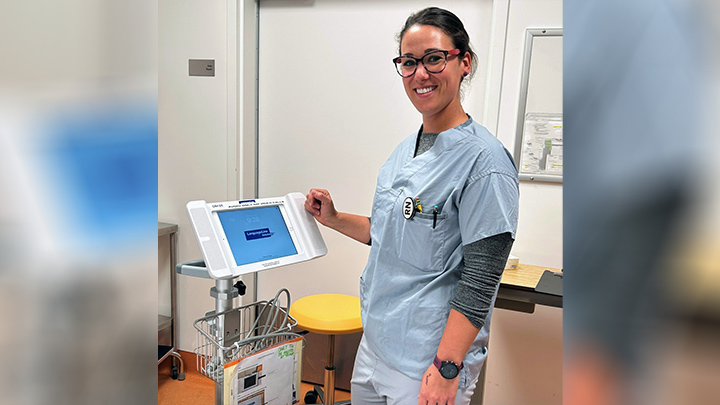
September 5, 2023

Registered Nurse Mel Stelfox poses with an Interpreter on Wheels unit at Chinook Regional Hospital in Lethbridge.
Story by Sherri Gallant | Photo by Jennifer Vanderlaan
LETHBRIDGE — Healthcare appointments can be stressful for New Canadians who have difficulties speaking English.
But having access to professional medical interpreters offered through Alberta Health Services Interpretation and Translation Services can help relieve that stress. Patients who have difficulty speaking and understanding English can confidently communicate and understand the practitioner. The service is easily accessible by a phone call and request for an interpreter in the desired language.
South Zone has recently acquired Interpreter on Wheels units in Emergency Departments and Labour and Delivery at Medicine Hat and Chinook Regional Hospitals, and at Bow Island, Brooks, and Bassano health centres. The Interpreter on Wheels offers video as well as audio, enabling access to 240 different languages including American Sign Language for those with a hearing impairment.
Kayathiri Ganeshamoorthy, Provincial Lead for Interpretation and Translation Services, says having easily accessible professional medical interpreters is a priority.
“Alberta continues to grow in population and diversity with 27.1 per cent of Albertans speaking another language other than English at home. By ensuring interpretation services are available throughout the province, AHS continues to support Albertans with comprehensive, safe care in their native language at our sites” she says. “We will work with each site and understand the local languages needed to leverage existing tools to access interpretive services.”
Interpretation and Translation Services also works to ensure Limited English Speaking (LES) patients as well as deaf and hard-of-hearing patients and healthcare providers have the tools they need to understand each other through professional medical interpretation and translation.
“I think within our program somebody's using interpretive services at least every week,” says Lindsay Schwab, a Registered Dietitian and diabetes educator with the Alberta Healthy Living Program (AHLP). “I use it, and it’s used multiple times a week by cardiac rehab education, nutrition services, outpatient education and others.”
The practitioner places a call, identifies the desired language, and within a minute an interpreter is on the line.
“Someone will come in with either a new diabetes diagnosis or who has had diabetes for some time and needs help with management,” says Schwab. “I'm often showing people how to use diabetes devices. We talk about food, how medications work, and what's happening in the body with diabetes.
Without professional medical interpreters, it’s very hard to understand.
“As a healthcare professional, it just makes me feel more comfortable that the client is hearing what I'm saying. Without it, clients might have come in with a son or daughter who speaks some English and tries to interpret, but they don’t understand medical terminology and they would tell the parent what they think they heard, and that might not actually be correct.”
Schwab ensures her messages are understood by asking the interpreter to ask the patient to repeat back what they’ve just learned.
With an interpreter on board for the appointment, Schwab’s clients often want to bring up other medical issues.
“I can't help with those things, unfortunately, but if they do bring such things up, I'll let them know they have to see their family doctor for that. Sometimes they’ve already brought the issue up with their family doctor, but a professional medical interpreter wasn’t used and they didn’t feel understood.”
AHS Interpretation and Translation Services extends their support to Primary Care Networks and community physicians who would like to enroll, says Ganeshamoorthy.
“We encourage doctors to use professional medical interpreters,” she says. “When the patient understands and is understood, health outcomes are better. And having a patient give consent for treatment in their own language is critical.”
Dr. Mishka Singh, a Lethbridge family physician who came to Canada from South Africa in 2015, says she changed how she communicates with her patients here after working in a refugee camp overseas.
Plus, during her medical training in Cape Town, language could be such a barrier that communicating with patients sometimes had to be acted out like a game of charades because interpreters were not available. She learned firsthand how vital effective communication is, and today she often relies on a professional medical interpreter.
“When refugee and immigrant patients come in and I use a professional medical interpreter I ask more questions than I did before — questions about the daily life they left behind, their culture, the work they did.” Not only do such inquiries strengthen the doctor-patient relationship, but Singh adds that it improves diagnosis and treatment outcomes.
Schwab has been using the service weekly for five or six years, calling AHLP ‘early adopters.’ She’s learned to brief the interpreter with a quick overview of what she’ll be talking about to the patient before they get started.
Schwab says clients are appreciative of the services offered by AHS' professional medical interpreters to help them communicate.
“I think sometimes, especially when people come here without a family, they might not have heard their own language in a long time. When they hear it spoken in the office over speakerphone you can just see their reaction. I think it can be very isolating to be somewhere where you don't speak the language and you're trying to access healthcare.”